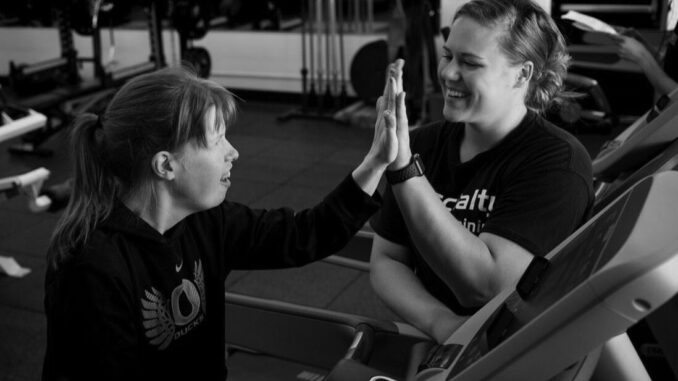
As spring training kicks into full gear, Lewis & Clark’s athletes find themselves sharing their weight room with a unique program. Specialty Athletic Training, founded in 2012 by LC alum Ryan Lockard ’07, offers personal training services to individuals with disabilities to encourage healthy habits and personal growth through movement.
When Lockard was still at LC, he completed his capstone project on the effects of exercise on special-needs individuals. Later, while a part of the football coaching staff, he worked with the LC athletic director at the time to start the Specialty Athletic Training program.
Specialty Athletic Training has expanded to work in four locations around the greater Portland area, offering personal and group coaching to clients with a range of disabilities. Yet their home base is still the LC campus, where the social aspect sets their services apart.
Emily Hatch, certified strength and conditioning specialist, is the Portland Metro District Manager, and credits the shared facilities with transformative benefits for Specialty Athletic Training’s clients.
“Our main goal is to get people moving and to have a good time,” said Hatch. “And this is a wonderful place for us to do it, because there’s so much interaction with the student athletes and the students on campus.”
Hatch went on to explain more about how these programs can impact the lives of the individuals they serve.
“A lot of our clients aren’t able to be a part of their school team,” said Hatch. “So there’s a lot of loneliness they may feel or a lack of self confidence. Having them come to their workout every week, they get to meet new friends. That’s almost the best part of it — not only the effects of exercise within your body, but also making friends. I think this allows our clients to feel more confident.”
Most of the students that work out alongside Specialty Athletic Training’s clientele are simply sharing the space, offering the encouragement and camaraderie characteristic of a communal exercise experience. Some LC students also work with the company as part of their education, creating lasting relationships as they come back week after week to work with their clients.
“We’re in the weight room a lot so there’s a lot of student athlete interaction,” Hatch said. “We also have interns who are looking to do their capstone project … What’s great is (for example) one of our clients, because he’s in the weight room so much, (he) has befriended a lot of the athletes and they know him and he gets really excited to see the friends he’s made here.”
As many clients might be nervous about starting their gym journey, Specialty Athletic Training works to build steady relationships and trust in such a vulnerable environment. That repeated interaction is huge for building strong social confidence, a major goal for Specialty Athletic Training. While getting active is definitely important, clients also need to be supported through the interpersonal aspects of athletics.
“I’m such a huge proponent for mental health support,” said Hatch, “and a lot of the individuals we work with, due to their diagnoses or their lifestyle, they’re not able to build those healthy habits. They don’t really have the social skills that can put them in a situation where they can thrive. So we want to be that catalyst or a support for them where they can not only build healthy habits for themselves, but also build social skills so they can go out in the world and be more independent.”
Students who are interested in working with Specialty Athletic Training should keep the interpersonal skills required in mind. The company’s philosophy is, at its core, about bettering lives through exercise, but it is a more holistic goal than simply getting active.
There is also no one path towards a career with Specialty Athletic Training either — staff backgrounds include mental health and counseling, physical training and sports medicine.
“Ultimately, we want good humans who are able to work in this environment, to motivate other individuals,” said Hatch.
Subscribe to the Mossy Log Newsletter
Stay up to date with the goings-on at Lewis & Clark! Get the top stories or your favorite section delivered to your inbox whenever we release a new issue.

Leave a Reply